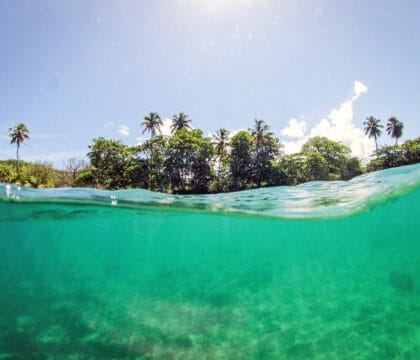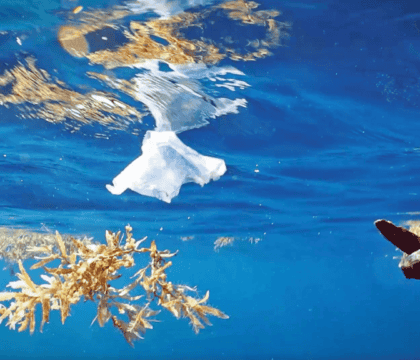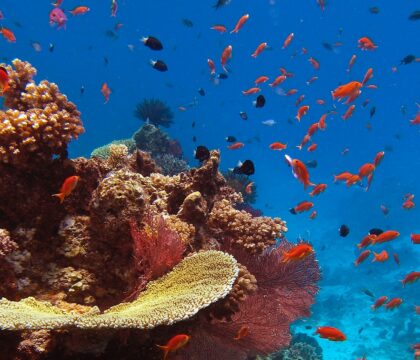February 2, 2020 • News Announcements, Program Updates
Oceanic Society is proud to announce 14 small grants to sea turtle conservation projects in Central Africa, Chile, Colombia, Ecuador, Haiti, Indonesia, Jamaica, Nicaragua, Mexico, Thailand, and the United States. Oceanic Society has awarded the grants as part of our global State of the World’s Sea Turtles (SWOT) Program. Since 2006, SWOT’s small grants have helped field-based partners around the world to realize their research and conservation goals. To date, 93 grants have been awarded to 67 applicants in more than 45 countries and territories for work addressing three key themes: (a) networking and capacity building, (b) science, and (c) education and outreach.
A small grant is supporting leatherback turtle research in Indonesia. © Turtle Foundation
This year we also partnered with the Association of Zoos & Aquariums and their Sea Turtle SAFE (Save Animals from Extinction) Program to make six additional grants available for projects relating to the conservation of two of the top global priorities for sea turtle conservation: eastern Pacific leatherbacks and Kemp’s ridleys throughout their respective ranges.
The following are brief overviews of our 2019 grantees. Projects marked with an (*) were awarded as part of the AZA-SAFE partnership. Click here to learn more about the AZA-SAFE program.
- Equilibrio Azul (Ecuador) to educate the community and municipality of Puerto López on the importance of conserving and recuperating vital nesting habitat for its population of critically endangered east Pacific hawksbill sea turtles.
- RASTOMA (Central Africa) to reduce plastic pollution and its negative impacts on turtles along the Central African coast through workshops and awareness campaigns on how to repurpose plastic waste.
- ProTECTOR, Inc. (Thailand) to establish a Gulf of Thailand Nesting Recovery Network that will capacitate and coordinate sea turtle conservation efforts of local communities on the Gulf of Thailand.
- Janie Reavis, Arizona State University (USA) for testing and developing novel bycatch reduction technologies that aim to reduce the incidental capture of sea turtles and other marine megafauna in small-scale fisheries.
- Turtle Foundation (Indonesia) to satellite track nesting female leatherbacks in the Mentawai Islands of West Java, Indonesia, part of the “data deficient” Northeastern Indian Ocean subpopulation of leatherback turtles, in order to improve conservation efforts.
- Casa Congo (Nicaragua) to establish a sea turtle hatchery at Río Escalante – Chacocente Wildlife Refuge in Nicaragua that will not only protect sea turtle nests from poaching, but also serve as an environmental education tool in the local communities.
- Haiti Ocean Project (Haiti) to study green and hawksbill sea turtle harvest and bycatch rates by artisanal fisheries and assess local attitudes towards sea turtles in the Nippes and Grand’Anse regions of Haiti.
- Bluefields Bay Fishermen’s Friendly Society (Jamaica) to continue and improve conservation efforts at the Bluefields Bay sea turtle nesting beach through beach monitoring, nest protection, outreach, and information sharing.
- * Sea Turtle, Inc. (USA) to install bilingual signage at Texas beach entrances that will inform the public about the presence of nesting Kemp’s ridley sea turtles, educate beachgoers on respectful activities, and increase reports of turtle sightings.
- * JUSTSEA Foundation (Colombia) to collaborate with Colombian fishermen to improve fishing practices that reduce the impacts of bycatch on east Pacific leatherback turtles.
- * Center for Environmental Management and Development, CIMAD (Colombia) to train and finance community members in the Chocó region on sea turtle nesting protocols that will increase the quantity and quality of data taken on nesting east Pacific leatherbacks.
- * Universidad Autónoma del Carmen (Mexico) to provide the local people of Isla Arena (Campeche) with environmental education and outreach activities that promote awareness of and respect for the Kemp’s ridley, hawksbill, green, and loggerhead turtles that use surrounding habitats.
- * Instituto de Fomento Pesquero (Chile) to educate youth, fishermen, and agencies that reside in northern Chile on the importance of protecting marine environments to reduce fishery impacts to east Pacific leatherback turtles, green turtles, olive ridleys, and other marine species in Chile’s waters.
- * Campamento Tortuguero Ayotlcalli (Mexico) to create a network that empowers local communities and conservation projects in their efforts to protect the hawksbill, leatherback, black, and olive ridley sea turtles that nest on the beaches of Ixtapa, Zihuatanejo, and Petatlan in Guerrero, Mexico.
Congratulations to all of the 2019 grantees! Please visit www.SeaTurtleStatus.org/grants for more information about these and all past SWOT grant recipients, as well as application instructions and details.




